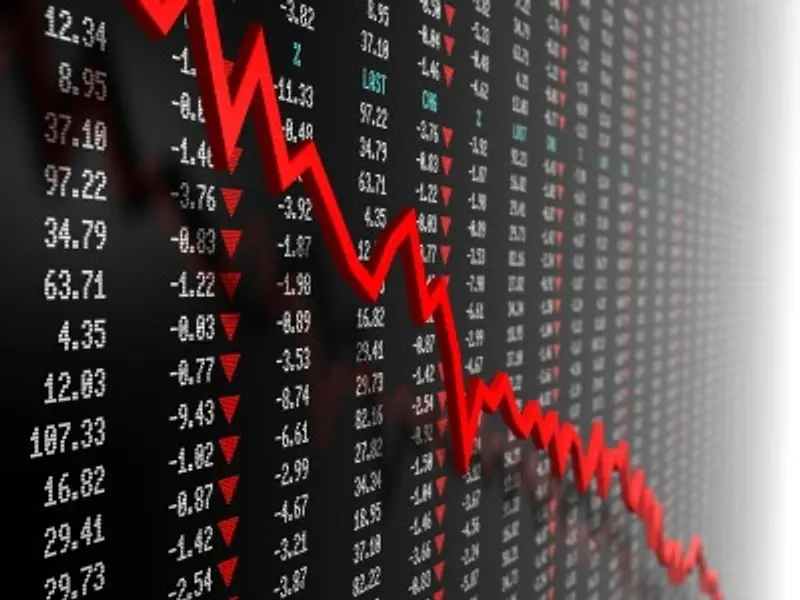
London‘s blue-chips headed south, after the Bank of England’s pause prompted a brief respite, as US stocks nursed further heavy falls on fears of higher interest rates, for longer.
The BoE decision hurt the pound, and while the Federal Reserve similarly paused overnight, the dollar was in decent shape on the assessment that it was a hawkish hold by the US central bank.
The FTSE 100 index ended down 53.03 points, 0.7%, at 7,678.62 on Thursday. The FTSE 250 lost 73.82 points, 0.4%, at 18,638.55, the AIM All-Share fell 7.79 points, 1.0%, at 738.91.
The Cboe UK 100 ended down 0.7% at 765.48, the Cboe UK 250 fell 0.4% at 16,278.12, and the Cboe Small Companies rose 0.8% to 13,557.96.
In European equities on Thursday, the CAC 40 in Paris shed 1.6%, while the DAX 40 in Frankfurt ended down 1.3%.
Sterling was quoted at $1.2297, lower than $1.2396 at the London equities close on Wednesday, but off an intraday low of $1.2244.
The BoE maintained bank rate at 5.25%, a more than 15-year high, in what was somewhat of a surprise move. According to FXStreet cited consensus, a 25 basis point hike was expected, though a tamer UK inflation reading earlier this week meant some investors dialled back their rate hike bets.
It ends a streak of 14 successive hikes since December 2021, which have shot up the bank rate from a Covid-19-induced low of 0.10%. It is the BoE’s first pause since November 2021.
It was a split outcome, with five Monetary Policy Committee members, Governor Andrew Bailey included, favouring the hold. Four would have preferred rates to have been raised by 25 basis points, they were Jon Cunliffe, Megan Greene, Jonathan Haskel and Catherine Mann.
Wednesday’s UK consumer price index data changed the face of the meeting. Annually, consumer prices rose by 6.7% in August, easing from a 6.8% rise in July, the data showed. August’s reading undershot market forecasts, as cited by FXStreet, which had predicted the inflation rate to heat up to 7.1%.
The annual core inflation rate - which excludes energy, food, alcohol, and tobacco - cooled to 6.2% in August, from July’s reading of 6.9%. August’s reading had been expected to come in at 6.8%.
Focus now is on whether the BoE hikes again, and when it might see fit to begin rate cuts.
Berenberg analyst Kallum Pickering commented: ‘We expect the BoE to keep bank rate unchanged at 5.25% through Q4 2023 and Q1 2024 before the first cut comes in Q2 2024. For end-2024 we project a 4.0% bank rate – implying 125bp of total cuts next year.’
Interest rate sensitive shares were on the up. Housebuilders Barratt Developments and Berkeley Group climbed 0.8% and 0.4%. Insurers Direct Line and Admiral rose 3.6% and 1.1%.
Elsewhere in central banking, hawkish words from the Federal Reserve stifled the mood in equity markets.
The Fed decided to hold the federal funds rate between 5.25-5.50%, a 22-year-high. Despite pausing rates, the accompanying rhetoric was hawkish, with Fed Chair Jerome Powell refusing to rule out further interest rate rises.
Projections released in the Fed’s dot-plot showed the likelihood of one more increase this year, then two reductions in 2024, two fewer than were indicated during the last update in June. Powell said going into 2024, ‘the time will come at some point, and I’m not saying when,’ to cut interest rates.
Members of the Federal Open Market Committee have revised up their economic growth expectations for this year, with gross domestic product now expected to rise by 2.1%. That was more than double the June estimate, supporting hopes that the world’s largest economy is not heading into recession. The 2024 GDP outlook was lifted to 1.5%, from 1.1%.
The euro traded at $1.0658, down from $1.0718. Against the yen, the dollar was quoted at JP¥147.38, down versus JP¥147.64.
In New York, the Dow Jones Industrial Average fell 0.5%, the S&P 500 lost 1.0% and the Nasdaq Composite slumped 1.2%.
On Friday, the Bank of Japan announces its latest interest rate decision.
Back in London, athleisure retailer JD Sports led the way in the FTSE 100, rising 9.3%.
It said pretax profit in the 26 weeks to July 29 surged 26% to £375.2 million from £298.3 million a year earlier. Revenue rose 8.3% to £4.78 billion from £4.42 billion.
JD Sports doubled its interim dividend to 0.30 pence per share from 0.15p.
JD Sports noted it returned to pre-pandemic levels of dividend cover, meaning the amount of profit that goes towards payouts.
The company explained: ‘During the pandemic, the group took a cautious approach with regards to dividend pay-outs so as to ensure that that cash reserves were maintained. As a consequence, in the aftermath of the pandemic, there was a disconnect between company earnings and dividend pay-outs.
‘The board recognises that JD is a very cash generative business and is committed to further enhancing returns to shareholders whilst ensuring that dividend pay-outs sit alongside other near-term cash outlays such as the minority buyouts of ISRG and MIG, the impending Courir acquisition and then, further out, future costs associated with any potential acquisition of the non-controlling interest in North America.’
Next added 3.2%, as it increased profit and sales guidance for its full year. It now expects full price sales in the second half to see 2.0% annual growth, compared to its previous guidance of 0.5%. This would take full-year growth to 2.6%.
It also raised full-year guidance for pretax profit to £875 million from £845 million previously, which would be up 0.5% from the prior year. Sales in the six months to July rose 5.4% year-on-year to £2.64 billion from £2.50 billion, as pretax profit rose 4.8% to £419.8 million from £400.6 million.
Ocado slumped 20% after Exane BNP cut the stock to ’underperform’.
DFS Furniture added 5.1%. It said it continued to win market share in a ‘very tough market’ during its financial year, which ended on June 25.
The furniture retailer said revenue from continuing operations fell 5.2% year-on-year to £1.09 billion from £1.15 billion, and pretax profit slumped 49% to £29.7 million from £58.5 million.
Underlying pretax profit before brand amortisation was £30.6 million, which was in line with its interim guidance, but down roughly half year-on-year from £60.3 million.
It expects underlying profit before tax and brand amortisation to improve in the low single digits in financial 2024, to a £30 to £35 million range.
It recommended a final dividend of 3.0p, down from 3.7p, bringing the annual total to 4.5p, down from 7.4p in the previous year.
Chief Executive Tim Stacey said: ‘The group is operating in one of the toughest economic climates we have experienced. Whilst we are confident the upholstery market will recover, forecasting the specific timing and pace of the recovery is challenging.’
Gold was quoted at $1,918.13 an ounce late Thursday afternoon, lower than $1,945.43 on Wednesday. Brent oil was trading at $94.17 a barrel, lower than $94.40.
Friday’s economic calendar has a slew of flash purchasing managers’ index readings, including the eurozone at 0900 BST, the UK at 0930 and the US at 1445 BST. There is also a UK retail sales reading at 0700 BST.
The local corporate calendar has half-year results from business-to-business media and events firm Ascential.
Copyright 2023 Alliance News Ltd. All Rights Reserved.




